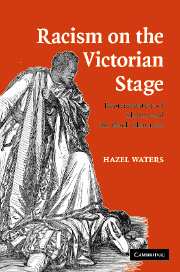Book contents
- Frontmatter
- Contents
- List of illustrations
- Acknowledgements
- Introduction
- 1 From vengeance to sentiment
- 2 The beginning of the end for the black avenger
- 3 Ira Aldridge and the battlefield of race
- 4 The comic and the grotesque: the American influence
- 5 The consolidation of the black grotesque
- 6 Slavery freed from the constraint of blackness
- 7 Uncle Tom – moral high ground or low comedy?
- Afterword
- Notes
- Bibliography
- Index
4 - The comic and the grotesque: the American influence
Published online by Cambridge University Press: 22 September 2009
- Frontmatter
- Contents
- List of illustrations
- Acknowledgements
- Introduction
- 1 From vengeance to sentiment
- 2 The beginning of the end for the black avenger
- 3 Ira Aldridge and the battlefield of race
- 4 The comic and the grotesque: the American influence
- 5 The consolidation of the black grotesque
- 6 Slavery freed from the constraint of blackness
- 7 Uncle Tom – moral high ground or low comedy?
- Afterword
- Notes
- Bibliography
- Index
Summary
If Ira Aldridge's career can be seen as a fight against ingrained notions of black inferiority, the early years of that career were punctuated by a cruel parody, first promulgated in 1824 by the famous comic actor Charles Mathews, in which he attacked the perceived incongruity of ‘black’ and ‘high culture’. It was a stereotype that continued to linger in various ‘comic’ guises long after its original perpetrator had died in 1835. Indeed, it could be argued that Mathews's real influence in perpetuating various derogatory images of the black lay nascent until the arrival of Jim Crow and Crow mania from America in 1836. For Crow inaugurated a new trend in English racial attitudes. It was a trend that incorporated a new conception of the black individual as no longer the vengeful African of yesteryear but a comic black American slave, grotesque in appearance, manners and language. Its effect was to render the black as a species apart; it was a conception that quickly rooted itself into popular culture and continued to grow there.
It was, I argue, the influence from America, which Crow crystallised and focused, that altered the tendency of English racial attitudes and beliefs, channelling them in new ways. This was achieved through the medium of comedy – far more effective, because more insinuating, for inculcating a world view than any amount of high seriousness.
- Type
- Chapter
- Information
- Racism on the Victorian StageRepresentation of Slavery and the Black Character, pp. 89 - 113Publisher: Cambridge University PressPrint publication year: 2007



